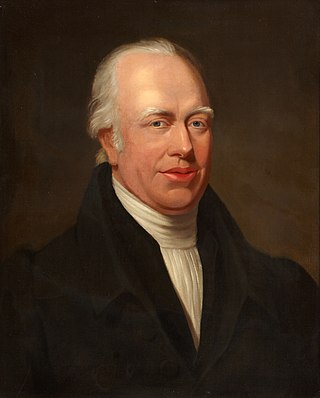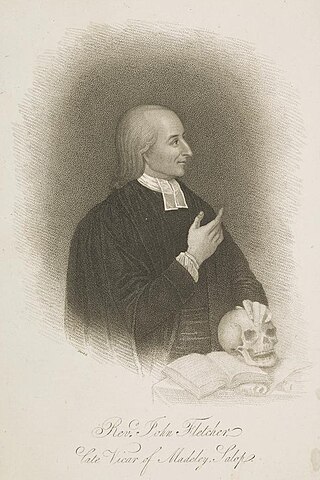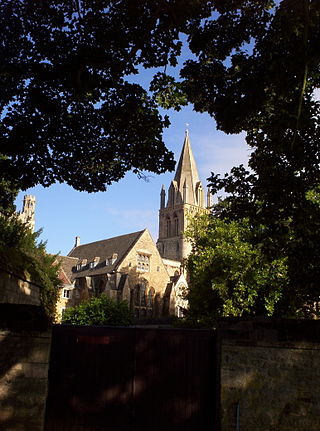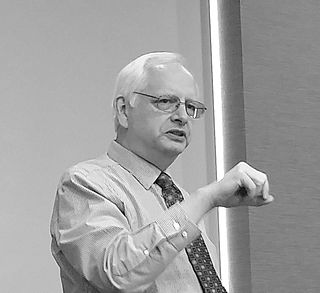
Methodism, also called the Methodist movement, is a group of historically related denominations of Protestant Christianity whose origins, doctrine and practice derive from the life and teachings of John Wesley. George Whitefield and John's brother Charles Wesley were also significant early leaders in the movement. They were named Methodists for "the methodical way in which they carried out their Christian faith". Methodism originated as a revival movement in the Church of England in the 18th century and became a separate denomination after Wesley's death. The movement spread throughout the British Empire, the United States, and beyond because of vigorous missionary work, and today has about 80 million adherents worldwide.

John Wesley was an English cleric, theologian, and evangelist who was a leader of a revival movement within the Church of England known as Methodism. The societies he founded became the dominant form of the independent Methodist movement that continues to this day.

Charles Wesley was an English leader of the Methodist movement. Wesley was a prolific hymnwriter who wrote over 6,500 hymns during his lifetime. His works include "And Can It Be", "Christ the Lord Is Risen Today", the carol "Hark! The Herald Angels Sing", and "Lo! He Comes With Clouds Descending".

Samuel Clarke was an English philosopher and Anglican cleric. He is considered the major British figure in philosophy between John Locke and George Berkeley. Clarke's altered, Nontrinitarian revision of the 1662 Book of Common Prayer continues to influence worship among modern Unitarians.

The Holiness movement is a Christian movement that emerged chiefly within 19th-century Methodism, and to a lesser extent other traditions such as Quakerism, Anabaptism, and Restorationism. The movement is historically distinguished by its emphasis on the doctrine of a second work of grace, generally called entire sanctification or Christian perfection and by the belief that the Christian life should be free of sin. For the Holiness Movement "the term 'perfection' signifies completeness of Christian character; its freedom from all sin, and possession of all the graces of the Spirit, complete in kind." A number of evangelical Christian denominations, parachurch organizations, and movements emphasize those beliefs as central doctrine.
The Primitive Methodist Church is a Methodist Christian denomination within the holiness movement. It began in England in the early 19th century, with the influence of American evangelist Lorenzo Dow (1777–1834).

The Covenant Renewal Service, or simply called the Covenant Service, was adapted by John Wesley, the founder of Methodism, for the purpose of the renewal of the Christian believer's covenant with God. Wesley's Directions for Renewing Our Covenant with God, first published in 1780, contains his instructions for a covenant service adapted from the writings of Richard Alleine and intended for use in Methodist worship as "a means of increasing serious religion." The first such service was held on 11 August 1755, in London.

Adam Clarke was a British Methodist theologian who served three times as President of the Wesleyan Methodist Conference. A biblical scholar, he published an influential Bible commentary among other works. He was a Wesleyan.
Christian perfection is the name given to theological concepts within some sects of Christianity that purport to describe a process of achieving spiritual maturity or perfection. The ultimate goal of this process is union with God characterized by pure love of God and other people as well as personal holiness or sanctification. Various terms have been used to describe the concept, such as entire sanctification, perfect love, the baptism with the Holy Spirit, the indwelling of the Holy Spirit, baptism by fire, the second blessing, and the second work of grace.

The Articles of Religion are an official doctrinal statement of Methodism—particularly American Methodism and its offshoots. John Wesley abridged the Thirty-nine Articles of the Church of England, removing the Calvinistic parts among others, reflecting Wesley's Arminian theology.
The Methodist Church of Great Britain is a Protestant Christian denomination in Britain, and the mother church to Methodists worldwide. It participates in the World Methodist Council, and the World Council of Churches among other ecumenical associations.

John William Fletcher was a Swiss-born English divine and Methodist leader. Of French Huguenot stock, he was born in Nyon in Vaud, Switzerland. Fletcher emigrated to England in 1750 and there he became an Anglican vicar. He began to work with John Wesley, becoming a key interpreter of Wesleyan theology in the 18th century and one of Methodism's first great theologians. Fletcher was renowned in Britain for his piety and generosity; when asked if he had any needs, he responded, "...I want nothing but more grace."
The Character and Death of Mrs. Hester Ann Rogers is a Methodist tract from 1794, still in print in 2008. The text is a publication of the sermon given by the Reverend Thomas Coke upon the death of the Methodist writer Hester Rogers, with an appendix written by her husband James Rogers; there is a third section, a “Supplement to the Appendix—consisting of Miscellaneous Extracts from the Journals of Mrs. Hester Ann Rogers.” Coke's sermon and James Rogers' appendix both contain published passages from Hester Rogers' own book entitled A Short Account of the Experience of Mrs. H.A. Rogers, Written by Herself as well as unpublished excerpts from her journals and correspondence. The history of the “Supplement to the Appendix” is not clear.
Samuel Dunn was a British Methodist minister and religious writer.

Wesleyan theology, otherwise known as Wesleyan–Arminian theology, or Methodist theology, is a theological tradition in Protestant Christianity based upon the ministry of the 18th-century evangelical reformer brothers John Wesley and Charles Wesley. More broadly it refers to the theological system inferred from the various sermons, theological treatises, letters, journals, diaries, hymns, and other spiritual writings of the Wesleys and their contemporary coadjutors such as John William Fletcher.

The Holy Club was an organization at Christ Church, Oxford, formed in 1729 by brothers John and Charles Wesley, who later contributed to the formation of the Methodist Church. The brothers and associates, including George Whitefield, met for prayer, Bible study, and pious discipline.
The Wesley Study Bible is a Methodist-oriented biblical study text with introductory text for each book, explanations and commentary 'to help the reader to understand the biblical text', and with 'special references to the writings of John Wesley'.

Charles Atmore was an English Wesleyan minister.

The history of Methodism in the United States dates back to the mid-18th century with the ministries of early Methodist preachers such as Laurence Coughlan and Robert Strawbridge. Following the American Revolution most of the Anglican clergy who had been in America came back to England. John Wesley, the founder of Methodism, sent Thomas Coke to America where he and Francis Asbury founded the Methodist Episcopal Church, which was to later establish itself as the largest denomination in America during the 19th century.

Randy L. Maddox is an American theologian and ordained minister in the United Methodist Church. He served until 2020 as the William Kellon Quick Professor of Wesleyan and Methodist Studies at Duke University. Maddox also serves as the General Editor of the Wesley Works Project, a major scholarly project responsible for producing the first comprehensive and critical edition of the works of John Wesley. He is considered one of the leading authorities on both the theology of John Wesley (1703-1791) and the theological developments of later Methodism.










